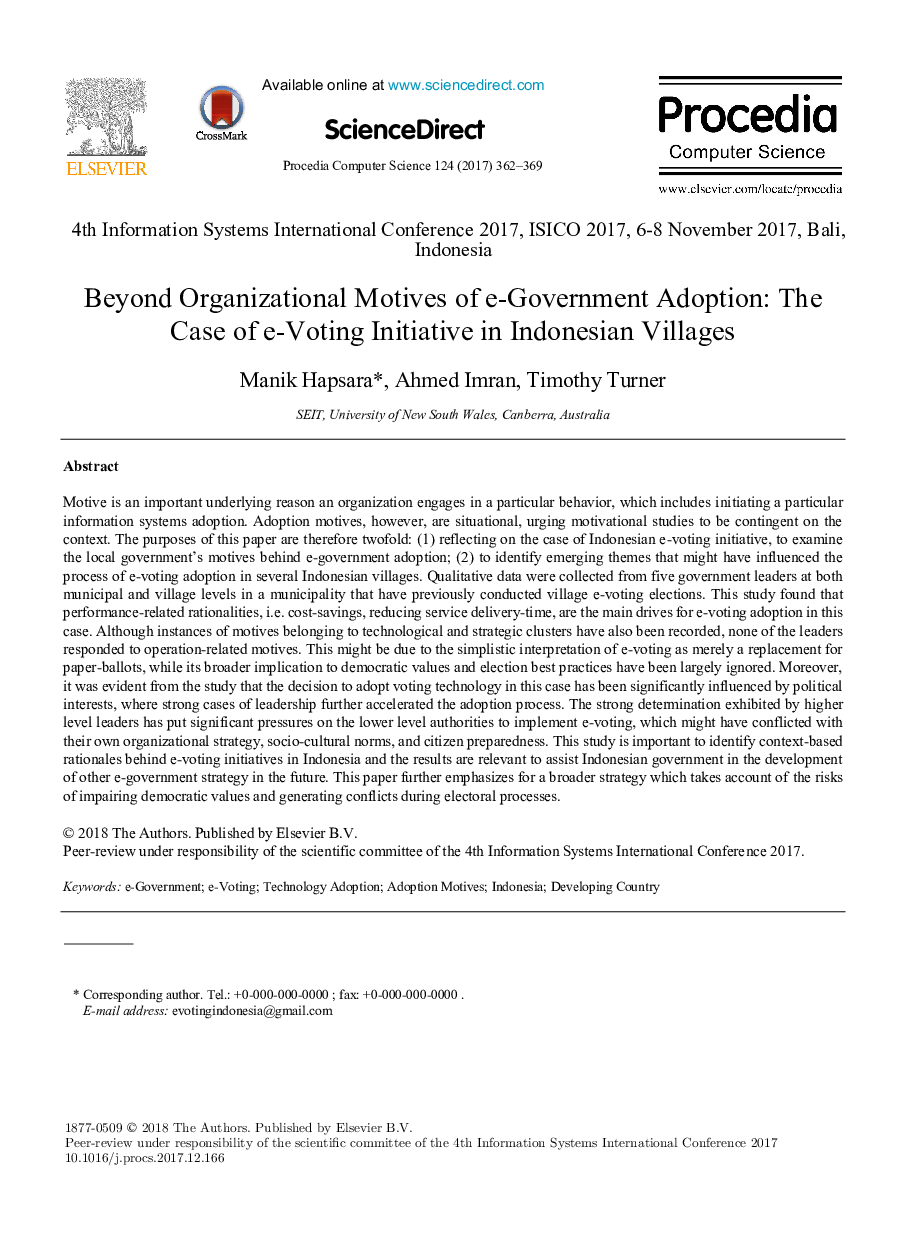| کد مقاله | کد نشریه | سال انتشار | مقاله انگلیسی | نسخه تمام متن |
|---|---|---|---|---|
| 6901111 | 1446492 | 2017 | 8 صفحه PDF | دانلود رایگان |
عنوان انگلیسی مقاله ISI
Beyond Organizational Motives of e-Government Adoption: The Case of e-Voting Initiative in Indonesian Villages
ترجمه فارسی عنوان
فراتر از انگیزه های سازمان تصویب دولت الکترونیک: مورد ابتکار الکترونیکی رای دهی در روستاهای اندونزی
دانلود مقاله + سفارش ترجمه
دانلود مقاله ISI انگلیسی
رایگان برای ایرانیان
کلمات کلیدی
دولت الکترونیک، رای گیری الکترونیکی پذیرش فناوری، انگیزه های پذیرش، اندونزی، کشور در حال توسعه،
ترجمه چکیده
انگیزه دلیل اصلی مهم است که یک سازمان در یک رفتار خاص دخیل است، که شامل ایجاد یک سیستم خاص اطلاعاتی است. با این حال، انگیزه های تصویب، وضعیتی هستند، و مطالعات انگیزشی را به شرایط خاص متصل می کنند. بنابراین اهداف این مقاله به دو دسته تقسیم می شوند: (1) منعکس شدن در مورد ابتکار ارزیابی الکترونیکی اندونزیایی، برای بررسی انگیزه های دولت محلی در پی تصویب دولت الکترونیکی؛ (2) شناسایی مباحث در حال ظهور که ممکن است بر روند تصویب الکترونیکی رای گیری در چند روستای اندونزی تأثیر داشته باشد. داده های کیفی از پنج رهبر دولت در سطح شهرداری و روستا در یک شهرداری که قبلا انتخابات رأی دهی الکترونیکی را برگزار کرده بودند جمع آوری شد. این مطالعه نشان داد که عقلانیت های مربوط به عملکرد، یعنی صرفه جویی در هزینه، کاهش زمان تحویل خدمات، درایور اصلی برای تصویب الکترونیکی در این مورد هستند. اگر چه مواردی از انگیزه های مربوط به خوشه های فن آوری و استراتژیک نیز ثبت شده است، هیچ یک از رهبران به انگیزه های مربوط به عملی پاسخ نداده اند. این ممکن است به دلیل تفسیر ساده ای از رای گیری الکترونیکی به عنوان تنها جایگزینی برای برگه های رای گیری باشد، در حالی که پیامدهای وسیع آن به ارزش های دموکراتیک و بهترین شیوه های انتخابات تا حد زیادی نادیده گرفته شده است. علاوه بر این، از این مطالعه مشخص شد که تصمیم به اتخاذ فن آوری رای گیری در این مورد تحت تاثیر منافع سیاسی قرار گرفته است، در حالیکه پرونده های قوی رهبری روند تسویه را تسریع می بخشند. عزم قوی نشان داده شده توسط رهبران سطح بالا فشار زیادی بر مقامات پایین سطح برای اجرای رای گیری الکترونیکی، که ممکن است با استراتژی سازمانی خود، هنجارهای اجتماعی-فرهنگی و آمادگی شهروندان مواجه شده است. این مطالعه برای شناسایی منطقهای مبتنی بر مبانی مبتنی بر ابتکارات الکترونیکی در اندونزی مهم است و نتایج آن در راستای کمک به دولت اندونزی در توسعه سایر راهبردهای الکترونیکی در آینده است. این مقاله همچنان برای استراتیژی گسترده تر که بر خطرات خراب کردن ارزش های دموکراتیک و ایجاد منازعات در طی پروسه های انتخاباتی تأکید دارد، تأکید دارد.
موضوعات مرتبط
مهندسی و علوم پایه
مهندسی کامپیوتر
علوم کامپیوتر (عمومی)
چکیده انگلیسی
Motive is an important underlying reason an organization engages in a particular behavior, which includes initiating a particular information systems adoption. Adoption motives, however, are situational, urging motivational studies to be contingent on the context. The purposes of this paper are therefore twofold: (1) reflecting on the case of Indonesian e-voting initiative, to examine the local government's motives behind e-government adoption; (2) to identify emerging themes that might have influenced the process of e-voting adoption in several Indonesian villages. Qualitative data were collected from five government leaders at both municipal and village levels in a municipality that have previously conducted village e-voting elections. This study found that performance-related rationalities, i.e. cost-savings, reducing service delivery-time, are the main drives for e-voting adoption in this case. Although instances of motives belonging to technological and strategic clusters have also been recorded, none of the leaders responded to operation-related motives. This might be due to the simplistic interpretation of e-voting as merely a replacement for paper-ballots, while its broader implication to democratic values and election best practices have been largely ignored. Moreover, it was evident from the study that the decision to adopt voting technology in this case has been significantly influenced by political interests, where strong cases of leadership further accelerated the adoption process. The strong determination exhibited by higher level leaders has put significant pressures on the lower level authorities to implement e-voting, which might have conflicted with their own organizational strategy, socio-cultural norms, and citizen preparedness. This study is important to identify context-based rationales behind e-voting initiatives in Indonesia and the results are relevant to assist Indonesian government in the development of other e-government strategy in the future. This paper further emphasizes for a broader strategy which takes account of the risks of impairing democratic values and generating conflicts during electoral processes.
ناشر
Database: Elsevier - ScienceDirect (ساینس دایرکت)
Journal: Procedia Computer Science - Volume 124, 2017, Pages 362-369
Journal: Procedia Computer Science - Volume 124, 2017, Pages 362-369
نویسندگان
Manik Hapsara, Ahmed Imran, Timothy Turner,
